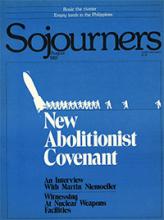Blessed are the peacemakers, for they shall be called children of God.
(Matthew 5:9)
There is a certain aura of distant horizons, of heaven and dreams and poetry about these words of Jesus, in spite of their familiarity. We would do better to read the word "blessed" as "happy" or "deeply contented"; but since these first 12 verses of the fifth chapter of Matthew's gospel account have always had the somewhat foreign name of "beatitudes," and probably always will, we have tended to spread a kind of halo over all of Jesus' preaching and proclamation.
When I was a boy, and later during World War I, the Sermon on the Mount was seen as suspended for the duration of our earthly existence. Theologians spoke quite openly of a "moratorium on the Sermon on the Mount," not realizing that by doing so they were giving Hitler and his brand of fascism a green light. By saying, "How can you love your enemy in this world?!", the kind of love Jesus preached was postponed to another world after this life.
It was a moment of great significance when, from my bunker cell in the Dachau concentration camp, I saw a fellow prisoner being hanged outside my window. I instinctively thought, "The poor fellow!"--and, "This damned gang of murderers!" And then suddenly a question bolted through my whole being: "What if Jesus had thought and expressed such a revengeful thought as he was hanging on the cross?" Then there would be no redemption, no wholeness, no peace, no shalom.
Jesus meant what he preached, in all seriousness, in all honesty, and knew full well who we are in our mortal existence when he said, "Happy are the peacemakers, for people will call them sons of God just as they have called me Son of God."
Read the Full Article

